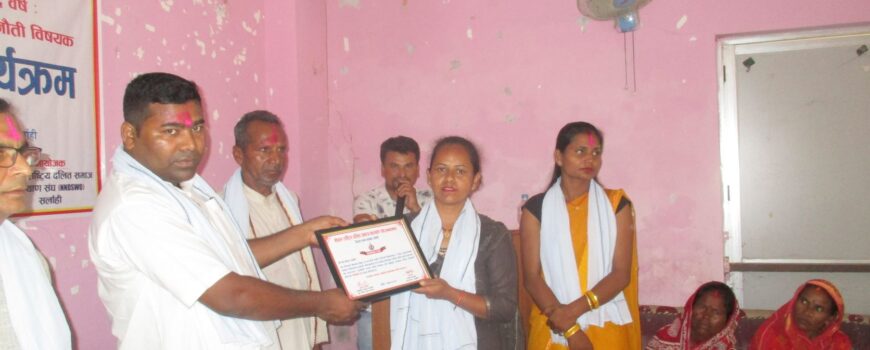
Due to structural differences, the Dalit community, which constitutes 20 percent of the total population of Nepal, has been marginalized socially, economically, and politically, and the condition of Dalit women is even worse. The Constitution of Nepal 2072 has for the first time ensured their rights under the fundamental rights. Although Article 24 of the Constitution guarantees the right against untouchability and discrimination and Article 40 guarantees the rights of Dalits, even today, Dalits -are still fighting for their basic human rights and to live life with self-respect. In this context, 4th of June is celebrated as National day for eradication of racial discrimination and untouchability in Nepal.
On the occasion of 16th National day for Eradication of Racial Discrimination and Untouchability at Malangwa on 4 June 2022, National Dalit Social Welfare Association Sarlahi (NDSWA) in collaboration with SAP Nepal organized public awareness rally followed by Interaction on Status of implementation, challenges of practice of declaration of discrimination free society since 2006. WoMEF formed by SAP Nepal took lead in conducting the public awareness rally with successful participation on Dalit men and women who are actively engaged in advocating for Dalit rights and concerns across the district. Interaction program titled “Status of implementation, achievements and challenges of national declaration of untouchable free nation” conducted by NDSWA in collaboration with SAP Nepal was chaired by Rajesh Paswan; and Rampreet Paswan (Former member of National Assembly) was chief guest of the event. In the event, the Dalit leaders mentioned that Musahars are still facing discrimination as untouchables from the educated and elite community especially in auspicious occasions.
At the event, organizations and individuals who have contributed in ensuring Dalit rights were awarded with letter of appreciation by the chief guest and chair of the event. SAP Nepal was also felicitated in the event for the contribution of this organization for upliftment of the underprivileged and backward community since its establishment. Towards the end of the event, the chair stated that in order to end untouchability and caste discrimination which is deeply rooted in society, effective implementation of laws and change in discriminatory social thinking and attitudes are necessary.

